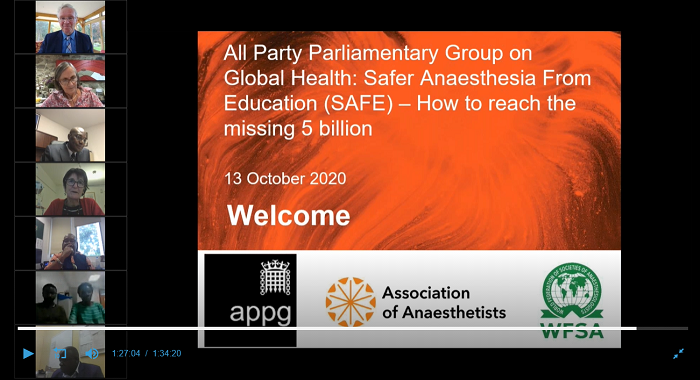Leading anaesthesia experts from around the globe convened for a special meeting of the UK All Party Parliamentary Group on Global Health to mark World Anaesthesia Day on 16 October.
With the title of ‘Safer Anaesthesia From Education (SAFE) – How to reach the missing 5 billion’ the meeting brought together policy makers and practitioners to discuss the role of anaesthesia in meeting global health targets. It also sought to highlight the impact of in-country training programmes such as SAFE in improving patient access to vital health services.
The meeting was a collaboration between the UK’s All Party Parliamentary Group on Global Health, WFSA and the Association of Anaesthetists of UK and Ireland.
Speakers included practicing anaesthesiologists from Norway, Uganda, the United Kingdom and Zambia as well as programme and policy makers from WHO –AFRO, Zambia and Tanzania.
With over 850 registrants drawn from 44 countries, the meeting was chaired by Lord Crisp the former Chief Executive of the UK National Health Service and chair of the APPG on Global health. He outlined to objectives of the meeting as an opportunity “to identify ways to support and create an enabling environment for a functioning health system through the strengthening of anaesthesia and surgery provision. ‘
‘This [meeting] is especially relevant in light of the considerable efforts and sacrifices that anaesthesiologists and other health professionals have made in the response to the COVID pandemic. ‘
Lord Crisp continued by highlighting the importance of access to anaesthesia:
‘Despite nearly 170 years having passed since the first anaesthetic procedure and the necessity of it for effective surgery, research from the The Lancet Commission on Global Surgery found that more than 5 billion people are without access to safe and affordable surgical care when needed.’
‘Additionally more than 30% of the Global Burden of Disease stems from conditions that could be treated through surgical intervention.’
‘The difficulty of accessing services and the anaesthesia workforce crisis are all important factors that will be covered in this meeting’
As a means to address the anaesthesia workforce needs-gap, WFSA and the Association developed the SAFE training programme. It is designed to equip obstetric and paediatric anaesthesia providers with the essential knowledge and skills to deliver safe care to their patients, even in very low resource settings. Since its launch in 2007, this anaesthesiologist-led SAFE training programme has provided practical in-country training to over 4,000 physician and non-physician providers in 45 countries.
The meeting focused on SAFE as part of a holistic approach to strengthening anaesthesia provision in low-resource settings. This integrated approach includes supportive regional and national policy environments like those provided by WHO-AFRO and by countries such as Zambia; the availability of local medical training colleagues such as the College of Anaesthesiologists to the East Central and Southern Africa (CANECSA); and the provision of anaesthesiologists-led continued professional development programmes such as the SAFE obstetric and paediatric skills courses.
Presentation snapshots
Dr Jannicke Mellin-Olsen, a senior anaesthesiologist from Norway and immediate past-president of WFSA, provided a succinct overview of global anaesthesia, outlining the role that anaesthesia plays in enabling health systems and realising universal health coverage targets. She evidenced the shortage of anaesthesia provision and the impact that workforce strengthening approaches such as the SAFE training programme are having. (Presentation starts at min 6:00 in the webinar recording)
Prof Jean-marie Dangou, NCD Coordinator for WHO-AFRO, discussed the vital role that anaesthesia plays in health systems. ‘Well-functioning health systems respond in a balanced way to a population’s needs and expectations. It is of paramount importance prioritizing essential surgery and safe anesthesia moving towards Universal Health Coverage.’ ‘The vital role that anaesthesiologists play has been emphasized by the COVID 19 pandemic. Their numbers in sub-Saharan Africa are woeful.’ (Min 15:00)
Dr. Mpoki Ulisubisya, Tanzanian High Commissioner to Canada and president of both the Society of Anaesthesiologists of Tanzania (SATA) and the College of Anaesthesiologists to the East Central and Southern Africa (CANECSA), spoke about the work of CANECSA in educating the next generation of anaesthesia providers in Africa and also looked at the role that SAFE has played in strengthening anaesthesia training in Tanzania. (Min 22:00)
Dr Christopher Chanda, National Coordinator of Anaesthesia at the Ministry of Health in Zambia, spoke from his position as both a consultant paediatric anaesthesiologist and national coordinator for the ministry of health about how anaesthesia services are a core component of Zambia’s health system and the country’s efforts to increase coverage. (Min 32:50)
Dr Isabeau Walker, Foundation Trustee at the Association of Anaesthetists and a SAFE programme lead was joined by Dr Andrew Kintu, President of the Association of Anesthesiologists of Uganda and Dr Mary Nabukenya, a Ugandan paediatric anaesthesiologist to speak about anaesthesia services in Uganda and the role of SAFE training programmes in obstetric and paediatric anaesthesia in strengthening anaesthesia provision. (Min 42:30)







